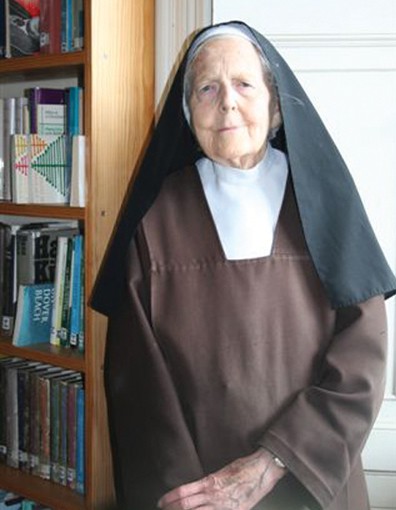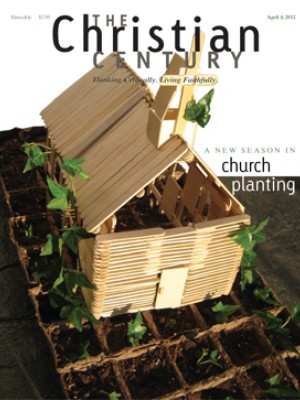Prayer is God's work: Ruth Burrows, Carmelite sister

Every year, Archbishop of Canterbury Rowan Williams commissions a book for the Anglican Communion to read during Lent. This year he asked Ruth Burrows—known as Sister Rachel in her Carmelite community—to write a book on how to know God. Williams noted that Burrows's book Guidelines for Mystical Prayer changed his own life more than 40 years ago. Her Lenten book for 2012, Love Unknown, is about prayer and the Christian life. Her other books include To Believe in Jesus and Essence of Prayer.
What has been the greatest challenge for you in living the contemplative life and living in community?
Coping with myself, both in community and in the "desert atmosphere" of Carmel. I am, by nature, extremely egocentric. I had to face myself head on. In my early years I felt repugnance for and anger at some practices brought in from Spain and France, alien to English culture and to what was then modern times. There was real physical hardship. I suffered a lot from the cold, not least because it "got me down."
Read our latest issue or browse back issues.
Looking back over your decades as a Carmelite, how has your understanding of the Carmelite life shifted?
My understanding of the Carmelite life was very vague before I entered the order. I saw it as an absolute way of giving oneself to God, which is what I was called to do. Growth in understanding was gradual, with no dramatic moment.
I was inspired by a young French Carmelite of the late 19th century, St. Thérèse of Lisieux. She lived her Carmelite life with a passion for "saving souls," as she expressed it, seeing her role as "love within the heart of the church." I felt no such passion but set myself to struggle to turn away from every self-centered motive and to offer my life for the coming of Christ's kingdom on earth.
In the early 1970s I formed a very supportive friendship with a holy woman who enlightened and enriched my life. She gave me a deeper understanding of what it was to be a true contemplative. If I were to point to a "moment," it would be then.
What were the challenges for you in accepting the request from the archbishop of Canterbury to write a book?
None of my other books was commissioned. In every other instance the ideas and the basic material were already there, and there was an impulse from within to write. This time there was none. I had no ideas and no ideas were given to me. There was only one thing and that was the conviction that I would please God by accepting the archbishop's request. It seems to me that in no other of my writings did I depend so completely on divine guidance. I have been amazed at the reaction to what seemed to me a very modest contribution indeed, and this makes me realize how truly God answered my prayers.
What is faith? What does it mean to have it or to lack it?
Faith is a profound mystery that we can never adequately explain. It is an interplay between divine grace and the human mind and will. We are speaking of Christian faith, and that is faith in Jesus Christ as the incarnate Word of God. The object of our Christian faith is the God revealed in Jesus Christ.
Faith is never a mere intellectual assent but always involves commitment. It is always in action, more a verb than a noun. Faith cannot be one facet or a particular aspect of my life, but my whole life. As St. Paul says, "My real life is the faith I have in the Son of God who loved me and delivered himself for me."
It is the Holy Spirit who enables us to believe—"No one can come to me except the Father draw him"—but we must cooperate with all our powers. And this means we must "labor for the food which endures to eternal life" (John 6:27). "This is the labor of God that you believe in him whom he has sent" (John 6:29). What can be more important?
Many people think they have no faith because they feel they haven't. They do not realize that they must make a choice to believe, take the risk of believing, of committing themselves and setting themselves to live out the commitment. Never mind that they continue to feel that they do not believe. Under cover of being "authentic" we can spend our lives waiting for the kind of certainty we cannot have.
What, then, is doubt?
I do not see how we can talk of faith if we eliminate the possibility of doubt. We cannot have the certainties that our nature craves and finds in the evidence of the senses. Perhaps most of the time we do not advert to doubt, but at times it can press heavily. As far as I am concerned, troublesome feelings of doubt seem a matter of the imagination failing to cope. Although we have no scientific verification for what we believe, there is nothing irrational in Christian faith but an enormous amount of data to support it.
In times of difficulty my anchorage is the Gospels. There I encounter Christ, "Light most beautiful," who overcomes the darkness of doubt. My faith is essentially faith in Jesus Christ: "You are Truth. Your word is truth and what is troubling me is a lie." I believe that there comes a point when a person is so held by God that, no matter how assaulted that person may be, faith stands firm, for "no one can snatch them from the hand of my Father" (John 10:29).
In an interview you once spoke about the inevitable failure of prayer. Could you say more about that?
Prayer can never be a failure. If I used that expression it would refer to how people express themselves: "I can't pray"; "my prayer is a failure"; "I pray and nothing happens; I'm praying to myself." This is to have a completely false idea of prayer.
To believe in the God of Jesus Christ is to know that, through what God in his love has done for us, there is absolutely no barrier between God and ourselves. We have free access. God is always available, always there, always with us—with you, with me. What is more, we know that God made us in love, precisely because God wants us wholly united to him for his and our total happiness.
Now, if we really believe that—and we must, surely, if we set aside some time to pray, affirm God's (or Jesus') loving presence and offer ourselves to him to do in us all he wants. He will not fail to purify us and gradually transform us as he unites us to himself. How can it matter that we do not feel it is happening?
Prayer is essentially God's work. Our part is to give time, do our best to keep attention, surrender ourselves as best we can. Then we can be sure that God works. Faith does not ask for signs, for tokens. When we really grasp that prayer is essentially God's business, not ours, we will never talk of failure, no matter how unsatisfactory prayer seems to us.
In Love Unknown you write about the limits of "techniques" for prayer. How do you go about prayer yourself?
If we believe that our God is utterly self-communicating, burning with desire to love us into perfect fulfillment and happiness, surely our fundamental attitude must be to let him do it, be receptive and not try to control the situation ourselves.
I'm sure some techniques can be helpful to quiet us down as a preparation for prayer, but it seems to me—I may be mistaken—they are sometimes used as a substitute for prayer. There is the danger of protecting ourselves from God's action by the control we are exerting in striving to be "empty" and passive. The "I" is very active in its attempt to surrender itself.
I am being unwise in writing on this subject as I have no experience and can judge only by what I have read. I get the impression of a subtle, unrecognized self-seeking, a desire to attain a certain psychological (spiritual) experience. I find this rather sophisticated approach to prayer hard to reconcile with the simplicity of Jesus' words on prayer. However, God blesses all sincere efforts and will look lovingly on all who seek him. If we are truly seeking him, he will enlighten us. This may prove painful. True prayer reveals us to ourselves in our sinfulness and spiritual inadequacy and at the same time enables us to accept it humbly and peacefully.
A great deal of your spiritual advice seems to be addressing Christian anxieties—a sense of failure and inadequacy in achieving the Christian life, perhaps. What do you say to someone facing this anxiety?
I think that anxiety and fear of some kind are part and parcel of being human. I would go so far as to suggest that fear, recognized or not, is our dominant emotion. Our instinct is to run away from fear, to shut it out, to draw the curtains against the dark, to keep ourselves busy, busy, busy so that it doesn't confront us.
To Christians I would suggest that they make a note of how many times in the Gospels Jesus addresses this inherent fear: "Be not afraid." When we think about it, he is the only one able to say this with authority, for he is the answer to our fears—to all of them.
Fundamentally, we are afraid of death and all the diminishments that are mini-deaths, things that damage our sense of self, make us feel insecure, unhappy and so on. In him we have perfect, absolute security. Yes, we must die. Yes, those we love must die, leaving us bereaved. Yes, the world is an uncertain, often threatening place. But we have the absolute certainty of being loved by the all-wise, all-loving Creator who promises us a future of such glory that it outweighs beyond measure the sufferings of this world. My advice to all is to study the New Testament, especially the Gospels, in order to get to know Jesus and so recognize him as the Way, Truth and Life, the one who has come to give us eternal life.






